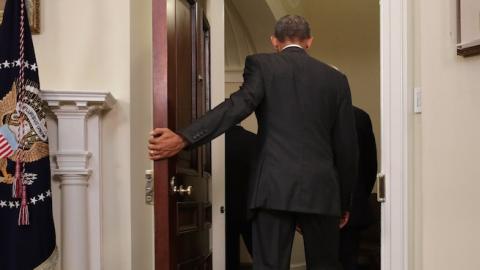As the initial shock of Great Britain’s vote to withdraw from the EU recedes, another withdrawal has been taking place. This withdrawal, albeit more gradual and undertaken with greater stealth, has far deeper consequences. It is the exit of the United States from global leadership and the alliance structure that it built and nurtured over nearly seven decades.
This “Amexit” is not simply defined by the Obama administration’s retreat from Afghanistan and Iraq, or its unwillingness to enforce the “red line” in Syria, to arm Ukraine, or to confront Chinese and North Korean aggressions. Nor is it only America’s diminished engagement with longstanding allies.
The administration is also expending considerable resources to ease tensions and “normalize” relations with longtime adversaries such as Iran and Cuba. Ahead of the NATO summit opening in Warsaw on July 8, the White House is floating a plan in which the U.S. would partner with Russia in Syria. This comes as NATO is preparing to approve the deployment of four multinational battalions to Poland and the Baltic states as a signal of unity and strength to an increasingly aggressive Moscow.
Many of America’s closest allies are so unnerved by Washington’s realignments that they are now pursuing bilateral and multilateral arrangements on their own. In the Middle East, Israel is enhancing its ties with Asian countries like India, Japan and South Korea and extending its outreach to Africa and Latin America.
It is also building relationships in Sunni Arab capitals, which share Israel’s profound concern over President Obama’s tilt toward Iran. Frustrated by Washington’s tepid response to Islamist extremism, a Saudi-led military coalition, including Egypt and the United Arab Emirates, has already taken unprecedented joint military action against ISIS in Yemen and Libya. It is expanding its membership to include more than two dozen other Muslim countries.
Japan, unsettled by President Obama’s faltering “rebalance to Asia,” is reforming its pacifist constitution and adopting a policy of collective self-defense.
Shinzō Abe’s government has launched bilateral initiatives to deepen ties with India, the Philippines and Australia, and to improve its fractured relations with South Korea to address Kim Jong Un's bellicose Pyongyang regime in the North.
In Europe, the British vote to leave the EU lays bare the risks of U.S. disengagement. The EU began as an American-inspired creation, and supporting the EU has been a cornerstone of U.S. policy. But when President Obama directly intervened in the referendum, direly proclaiming that Britain would be forced “to the back of the queue,” a majority of British voters were either offended by or unmoved by his words.
Beyond Britain, other European governments are now adopting what Daniel Keohane of the Carnegie Endowment calls a newly renationalized, “bottom up” approach focused on regional security—outside of a U.S.-European alliance. Concerned over terrorism and Russian aggression in Ukraine, they are reinvigorating their own defenses. France, which is already conducting counterterrorism operations in Central and North Africa, is boosting its defense budget by more than 8%. Poland, Slovakia, Hungary, the Czech Republic and the three Baltic nations together will increase their defense spending almost 20% this year over 2015 levels, according to the European Defense Agency.
It is certainly preferable for these nations not to be completely dependent on American military largess for all their defense needs. In the modern security sphere, however, effectiveness requires more than localized, “bottom up” planning. The world still needs leadership. But will it continue to be American leadership? And, if so, what kind?
Here, President Obama’s foreign-policy reset has produced a critical dilemma for his successor, in part because Mr. Obama often defines international engagement in narrow, military terms. A great many Americans—weary after two wars and a protracted economic malaise—welcome a reduced U.S. military footprint. But America’s role in regional and global security and stability is much broader than the direct exercise of military might. In the same way, mutual alliances among like-minded friendly nations are about far more than military pairings.
In crises, past American presidents—most notably Truman, Kennedy, Carter and Reagan—have marshaled the country’s immense economic, diplomatic and strategic resources to promote regional and global security. Those same tactics could have put a Vladimir Putin, an Iran, or an ISIS on clear notice that they would or will pay a high price for reckless actions.
Many threats today are not conventional military risks but complex challenges affecting cybersecurity, communications, civilian security and trade. But as Professor Michael Mandelbaum of Johns Hopkins University’s School of Advanced International Studies notes, America’s deterrent power, once sufficient to prevent even the development of nuclear weapons, has been seriously degraded.
We don’t know if a future president will seek to regain the international high ground, or if the Obama model will become the new norm. But there needs to be a national debate about whether America still has a special and indispensable role in the world. Those who believe that it does must make this case with less emphasis on military hardware and more on our standing as the world’s most successful democracy. Those who don’t believe in American indispensability need to recognize that a “post-Amexit” U.S. may be forgoing its ability to lead at all.



















